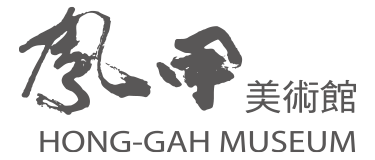The Other Side – Stitches in Time
Stitches in Time
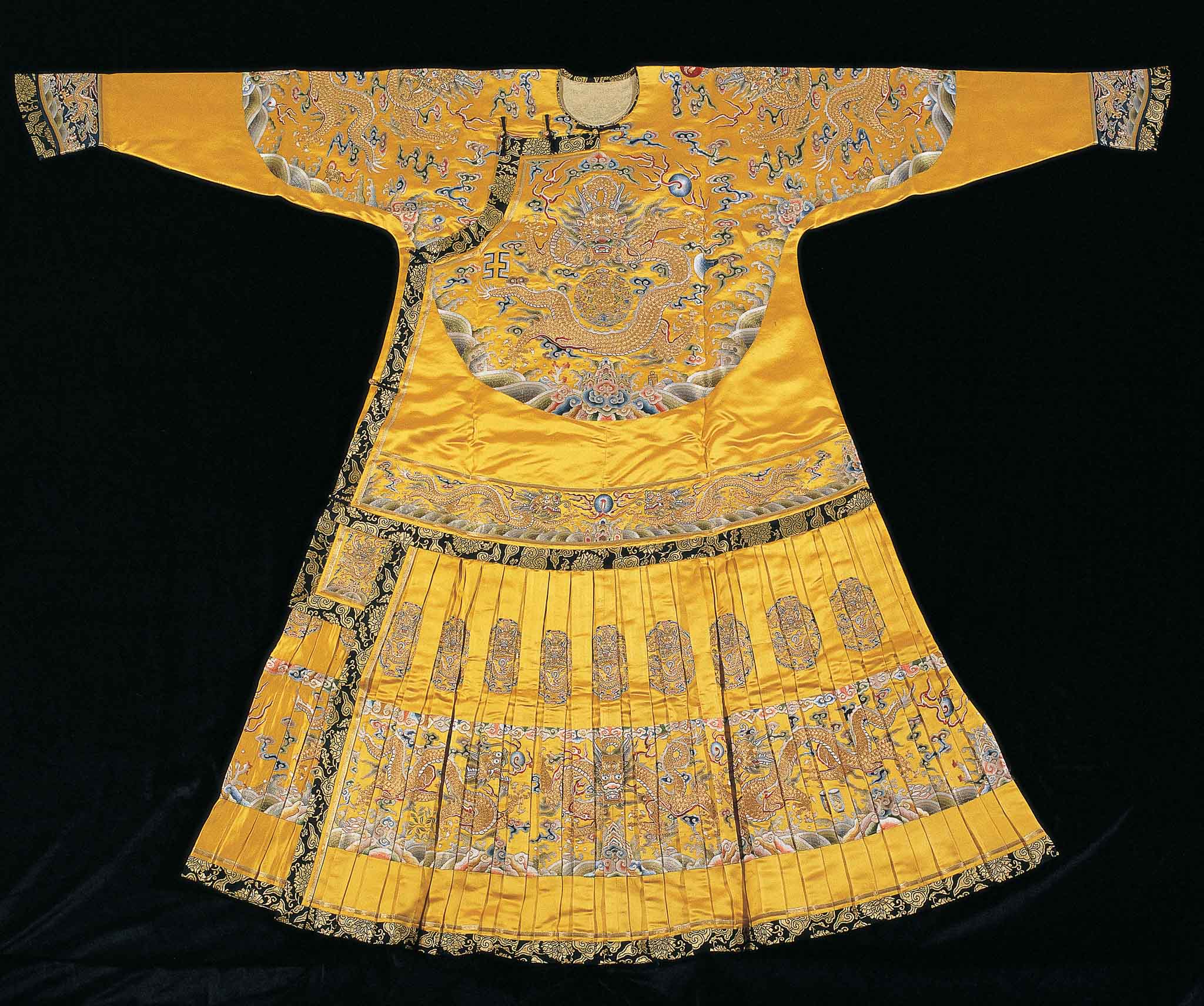
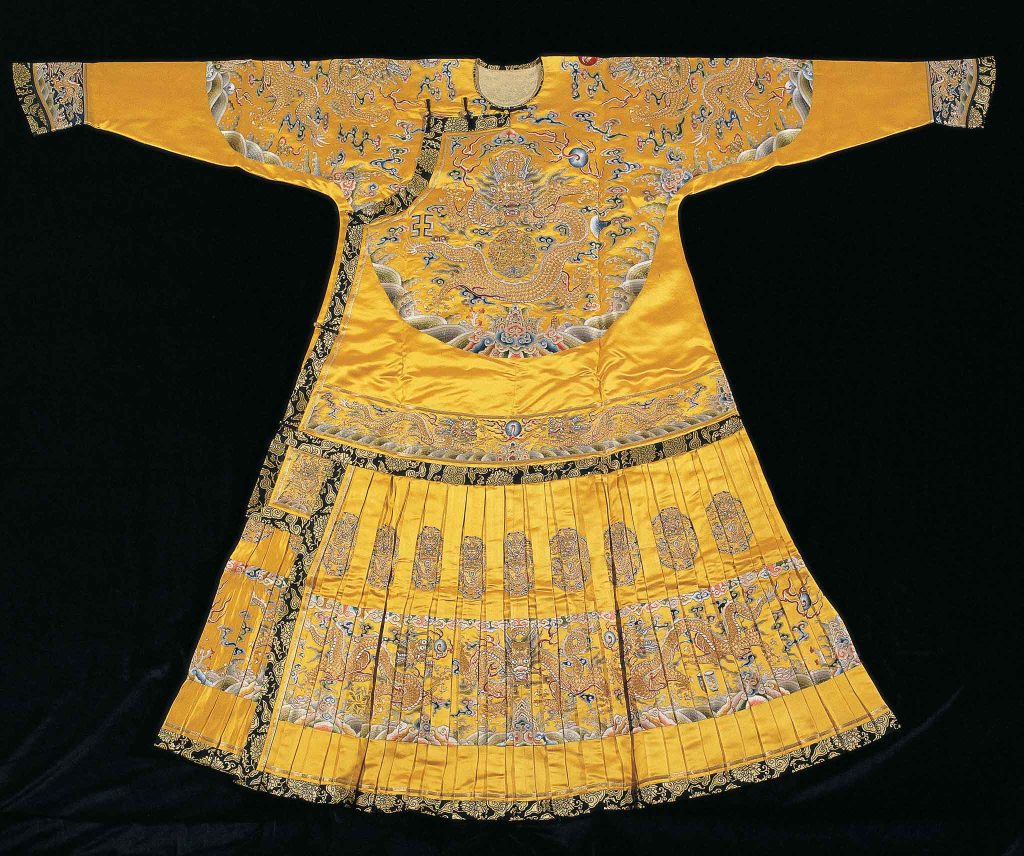
18. Embroidered Replica of a Qing Dynasty Imperial Dragon Robe
Suzhou Embroidery. Gu Wen-Xia Embroidery Studio
147 × 200 cm, 1990s
This embroidered robe is a meticulous reproduction of a Qing dynasty imperial dragon robe, crafted by Suzhou embroidery master Gu Wen-Xia and her studio. Yellow—the exclusive color of the emperor—dominates the garment, signifying imperial authority. A large, fully extended dragon is prominently embroidered at the center, flanked by symmetrically arranged smaller dragons and auspicious clouds. The robe features a total of nine dragons—five visible from both the front and back—reflecting imperial symbolism. The hem is adorned with curved wave patterns, cresting tides, and stylized rocks, symbolizing the emperor’s power as vast and unshakable as the mountains and seas—conveying hopes for national stability, peace, and prosperity. Beyond its extraordinary craftsmanship using Flat Stitch, Loose Trocar, and Nailing Stitch techniques, the piece offers a rare glimpse into the visual language of Qing court dress.
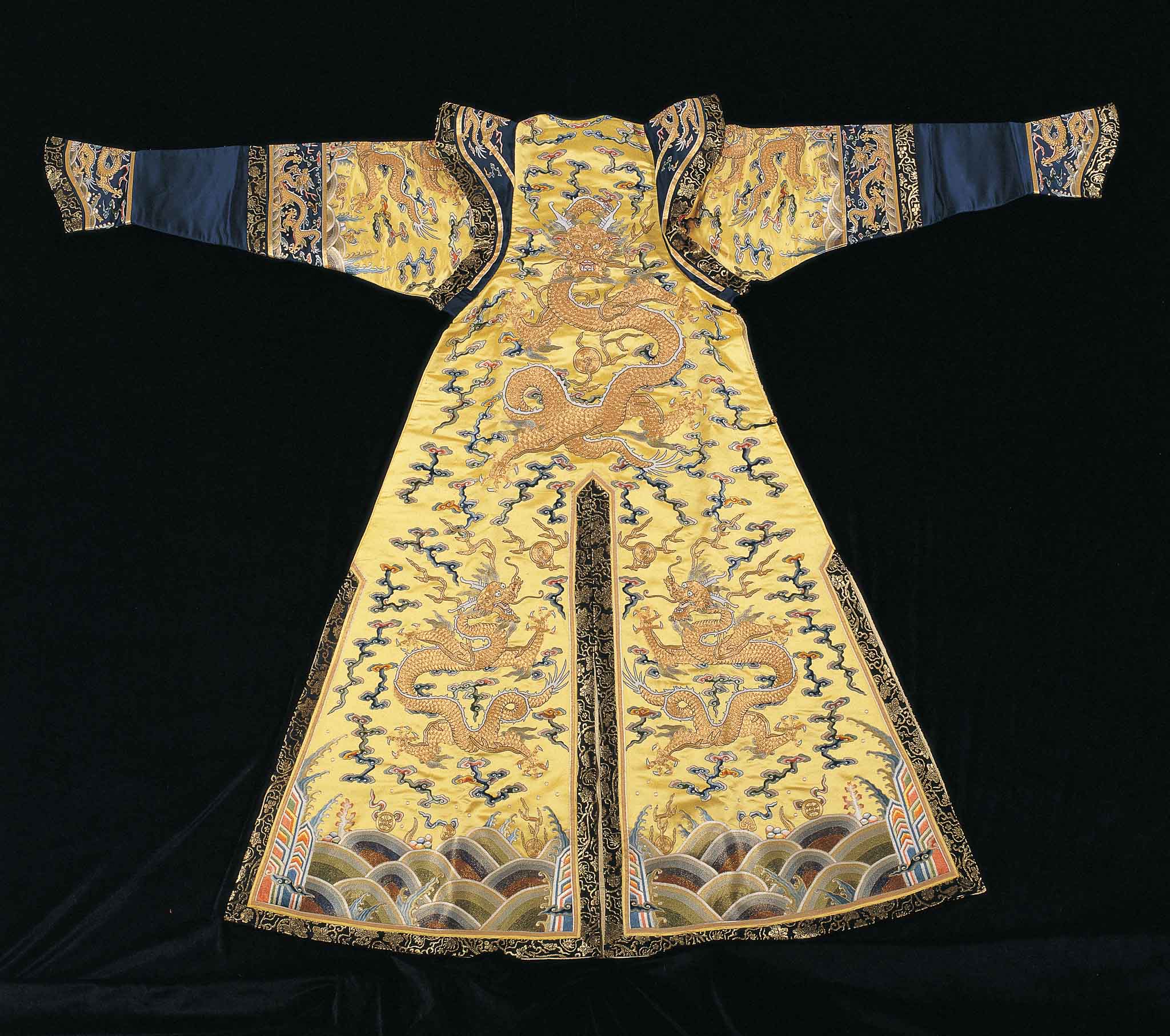
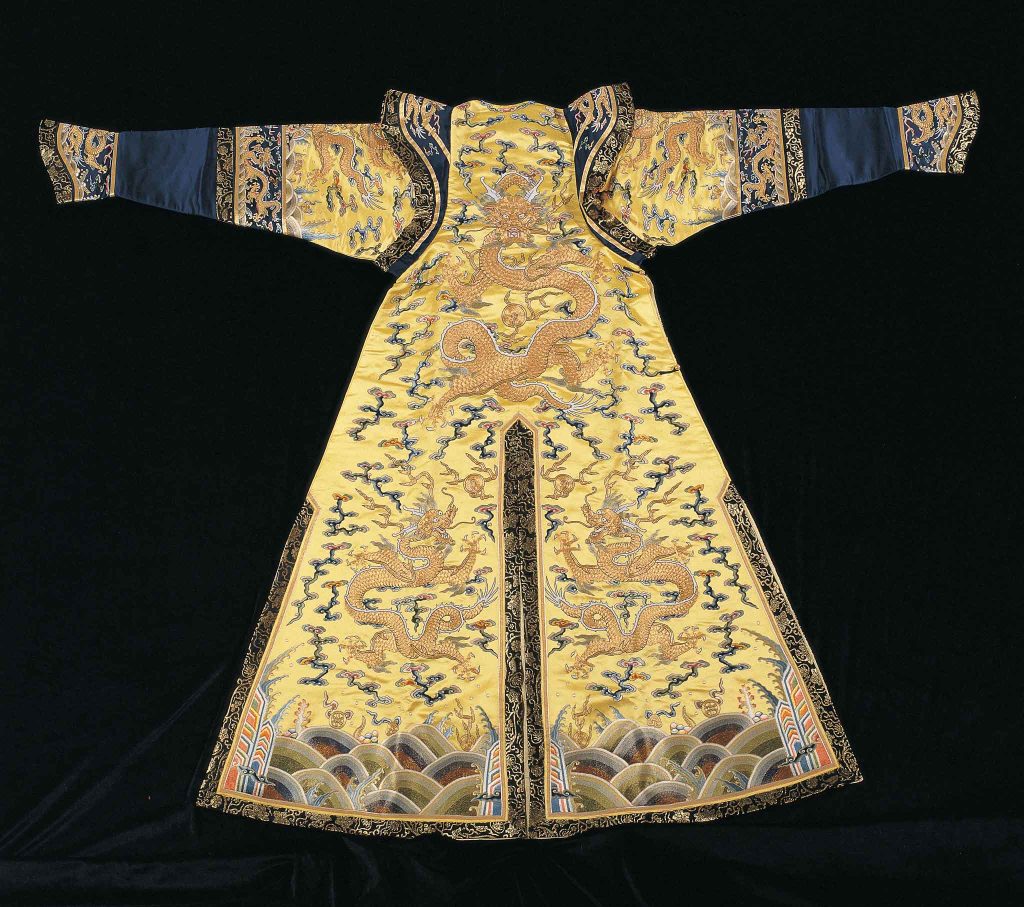
19. Embroidered Replica of a Qing Dynasty Imperial Dragon Robe
Suzhou Embroidery. Gu Wen-Xia Embroidery Studio
147 × 200 cm, 1990s
This embroidered robe is a meticulous reproduction of a Qing dynasty imperial dragon robe, crafted by Suzhou embroidery master Gu Wen-Xia and her studio. Yellow—the exclusive color of the emperor—dominates the garment, signifying imperial authority. A large, fully extended dragon is prominently embroidered at the center, flanked by symmetrically arranged smaller dragons and auspicious clouds. The robe features a total of nine dragons—five visible from both the front and back—reflecting imperial symbolism. The hem is adorned with curved wave patterns, cresting tides, and stylized rocks, symbolizing the emperor’s power as vast and unshakable as the mountains and seas—conveying hopes for national stability, peace, and prosperity. Beyond its extraordinary craftsmanship using Flat Stitch, Loose Trocar, and Nailing Stitch techniques, the piece offers a rare glimpse into the visual language of Qing court dress.
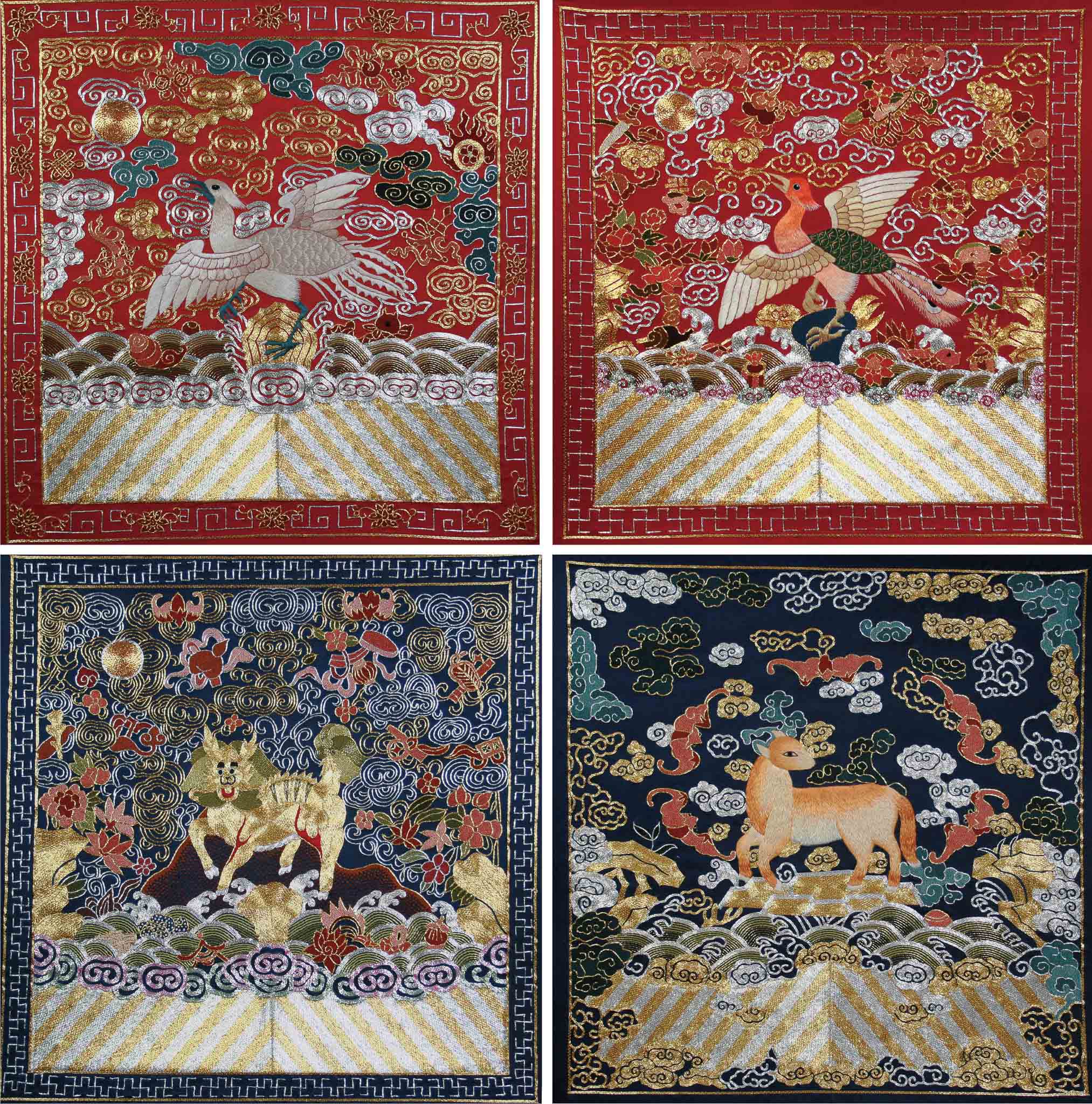
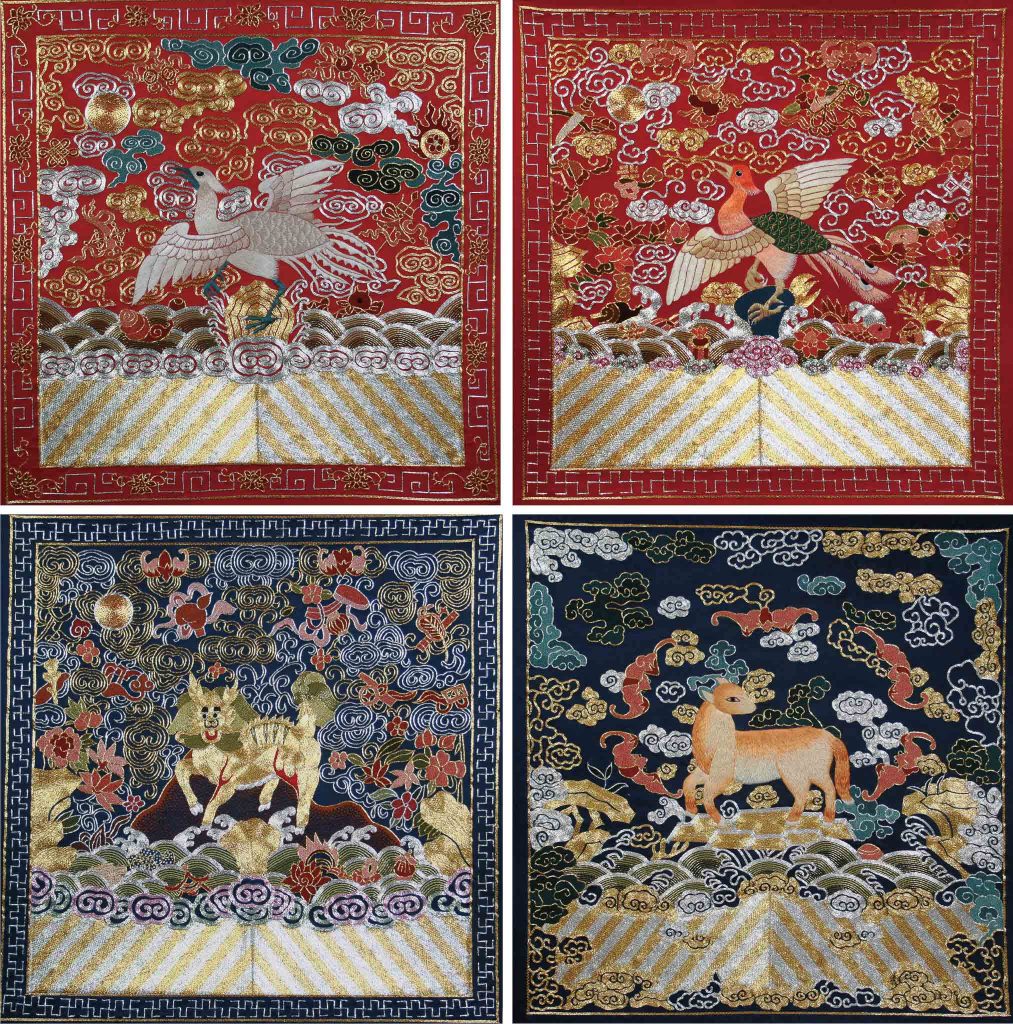
20. Embroidered Replica of Qing Dynasty Rank Badge
Suzhou Embroidery. Gu Wen-Xia Embroidery Studio
Each 43 × 43 cm
The Qing dynasty maintained a highly regulated system of official dress, with garments categorized according to rank and occasion—ranging from court robes and ceremonial attire to regular, travel, and rain garments. A common element of government officials was a set of long and short robes. These robes often featured rank badges, square or round embroidered panels sewn onto the chest and back, visually indicating the wearer’s official rank and status. The system of rank badges was inherited from the Ming Dynasty: circles were for royals and noblewomen, squares for civil and military officials. Civil officials were identified by bird motifs, ranging from the crane (first rank) to the flycatcher (ninth rank). Military officials were represented by powerful beasts—such as qilin, lions, tigers, and leopards—each corresponding to a specific grade. Altogether, the system reflects the Qing dynasty’s deeply stratified bureaucracy and rigidly enforced hierarchy. This set of 18 embroidered replicas, meticulously recreated by Suzhou Embroidery master Gu Wen-Xia, not only preserves an important aspect of Qing textile heritage but also illustrates the close connection between embroidery craftsmanship and the visual culture of imperial governance.
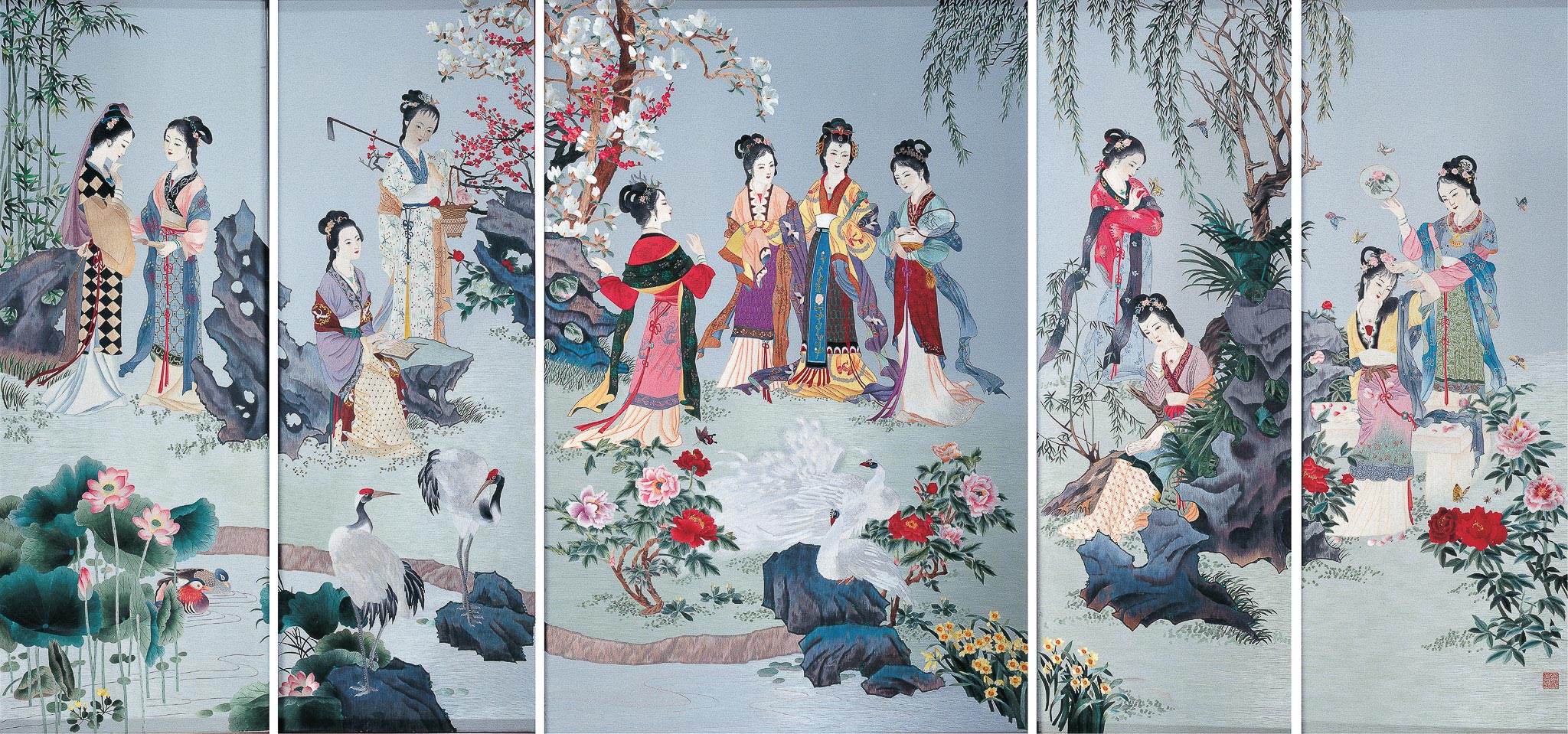
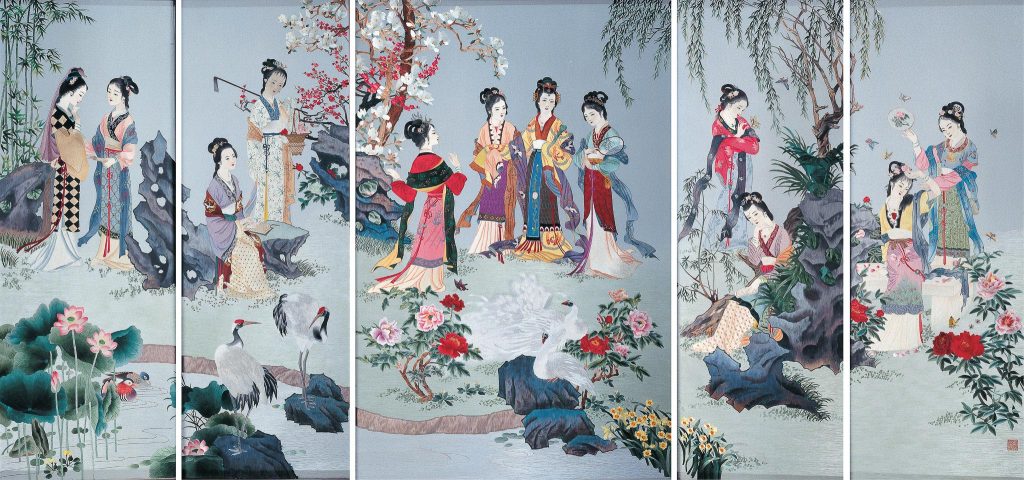
21. Twelve Beauties from Dream of the Red Chamber
Suzhou Embroidery. Anonymous.
211 × 305 cm
Twelve Beauties from Dream of the Red Chamber is a hallmark of Suzhou Embroidery, vividly portraying the lives and personalities of the twelve main female characters from the classic Chinese novel. The composition is richly detailed and emotionally nuanced, showcasing masterful embroidery techniques. In the scene depicting Lin Dai-Yu burying flowers, a white crane symbolizes her aloofness and sorrow. Behind Miao-Yu, blooming lotus flowers evoke her purity and solitary fate. The central panel features Wang Xi-Feng and Xue Bao-Chai, framed by peonies, magnolias, and willows, highlighting their grace and confidence. The flowers and flowing garments ripple in the breeze, expressing the characters’ complex emotions and destinies. This work beautifully blends sumptuous artistry with poetic depth, offering a deeply moving visual narrative.
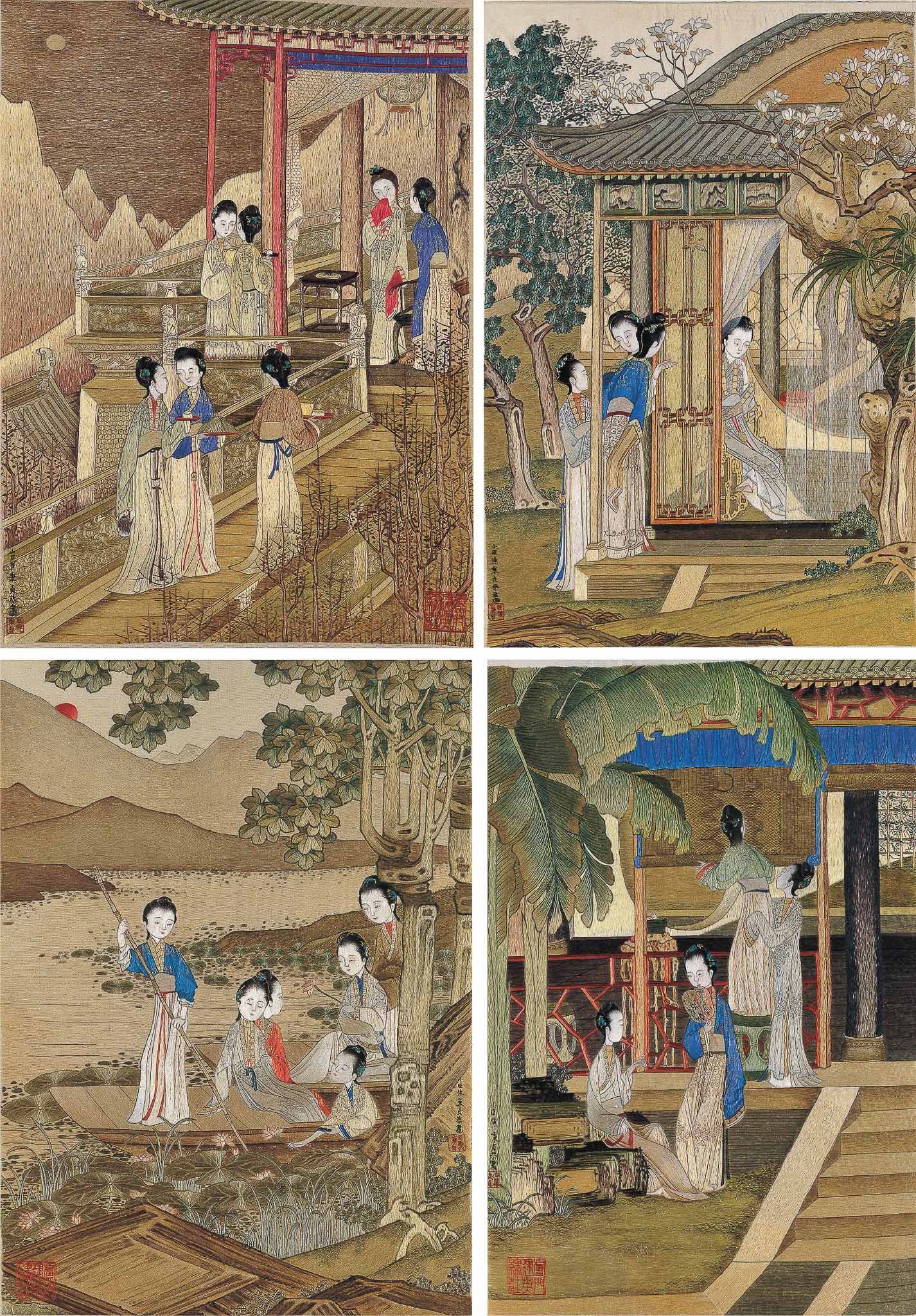
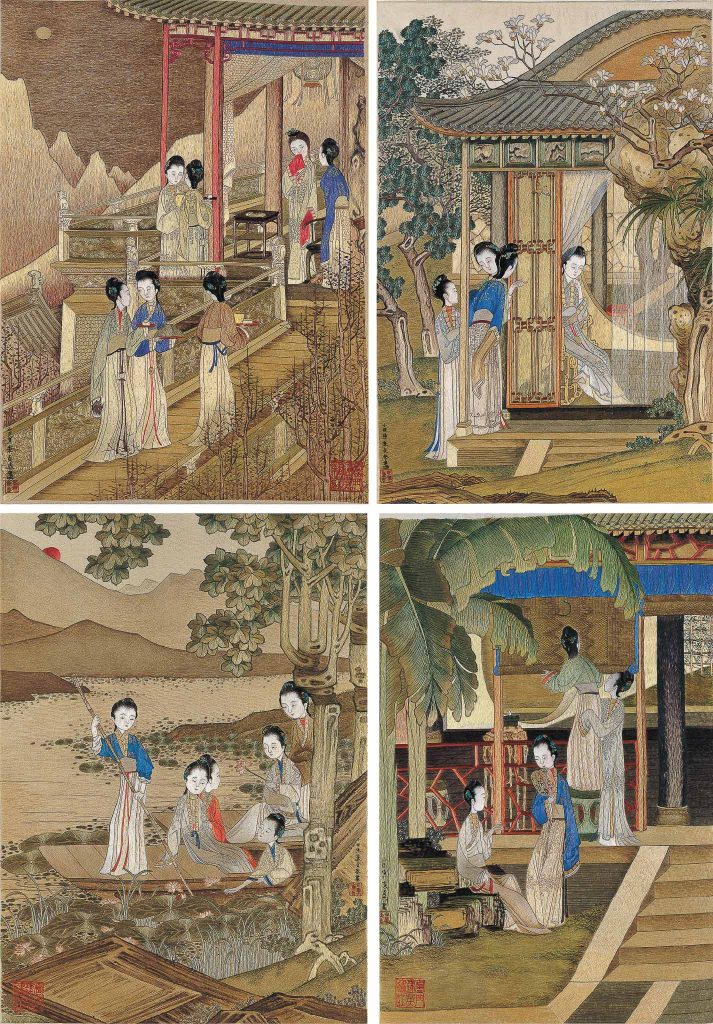
23. Embroidery of Jiao Bing-Zhen’s Album of Elegant Ladies
Suzhou Embroidery. Lu Jian-Ying Embroidery Studio
Each 41.5 × 32.5 cm, 1990s
This embroidery series is based on the Album of Elegant Ladies by Jiao Bing-Zhen, a court painter of the Qing Dynasty. Known for his refined brushwork and rich use of color, Jiao depicted women in moments of grace and leisure, set against intricate backdrops that blend Chinese garden architecture with Western techniques of light and perspective. These scenes include pavilions, terraces, lotus ponds, and drooping willows—landscape elements that together reflect the opulence and sophistication of Qing court aesthetics. The embroidered interpretation employs exceptionally fine Flat Stitch, using threads as thin as a strand of hair. Despite their modest scale, the works convey vivid expressions, spatial complexity, and a compelling interplay of detail and depth. They not only capture the charm of the originals but also enhance it with the layered texture and luminosity unique to embroidery.
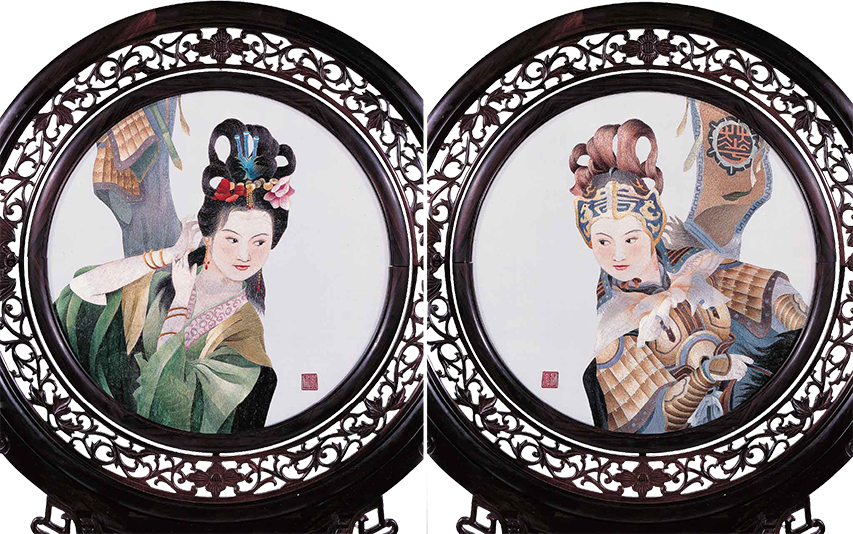

22. Mulan
Hunan Embroidery. Design: Huang Cui-Feng; Embroidery: Wang Yu-Hui
98 × 59 × 26 cm
The Ballad of Mulan, originating from the Northern and Southern Dynasties, tells the story of a young woman who takes her father’s place in the army during a military conscription and becomes a legendary female warrior. This piece uses Double-sided Disparate Embroidery to depict Mulan’s dual identity: her heroic presence on the battlefield and her peaceful return to rural life. As a general, she rides boldly with banners flying behind her, exuding strength and command. The pastoral side reflects the scene in the poem where Mulan removes her armor and returns to her quiet, domestic life.
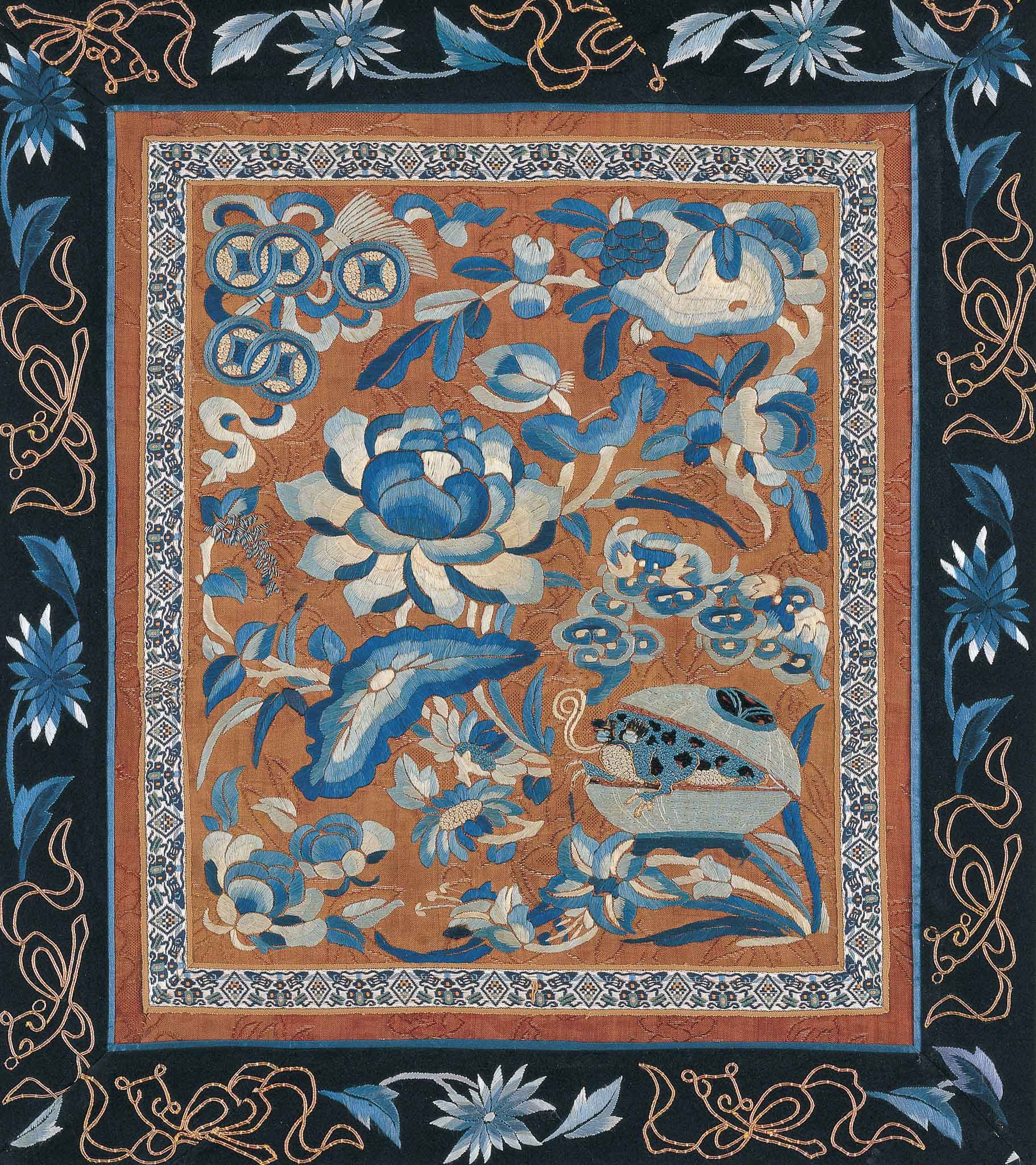
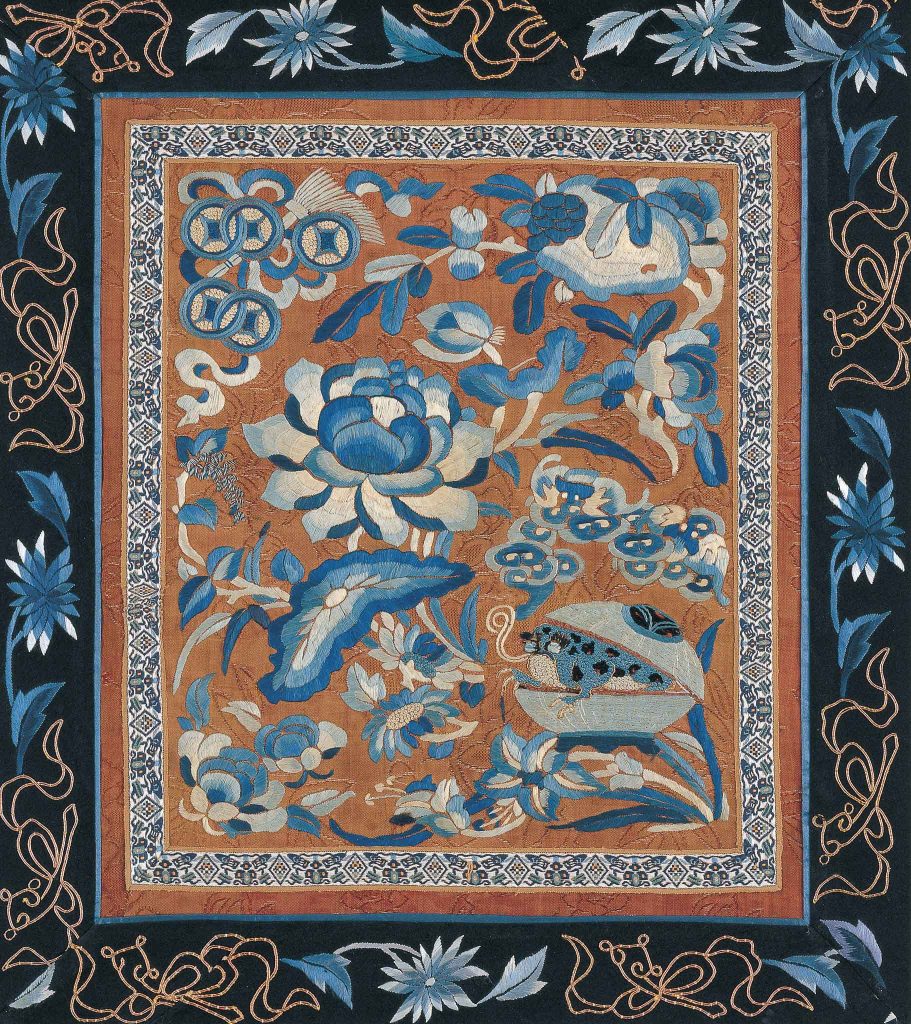
24. Lotus Pond
Guangdong Embroidery. Anonymous.
42 × 38 cm
While the collection primarily features Hunan and Suzhou Embroideries, the museum also acquired exquisite examples from other regions. Guangdong embroidery includes two main styles: Guangzhou Embroidery and Chaozhou Embroidery, with origins dating back to the Tang Dynasty. Guangzhou Embroidery, centered around the Pearl River Delta, often depicts Lingnan landscapes and auspicious symbols such as peacocks, lychees, and phoenixes. It is characterized by bright colors, rich compositions, and a layered, three-dimensional effect created through diverse and flexible stitching techniques. Chaozhou Embroidery is commonly used to decorate ancestral halls and is known for its distinctive Golden Stitch, reflecting strong religious and folk influences. From the Qing Dynasty onward, Guangdong Embroidery incorporated foreign aesthetic elements, diversifying its styles, with many artisans innovating new stitches and patterns. Notably, early Guangdong Embroidery was dominated by male artisans, with women taking over as the primary practitioners only in more recent times.
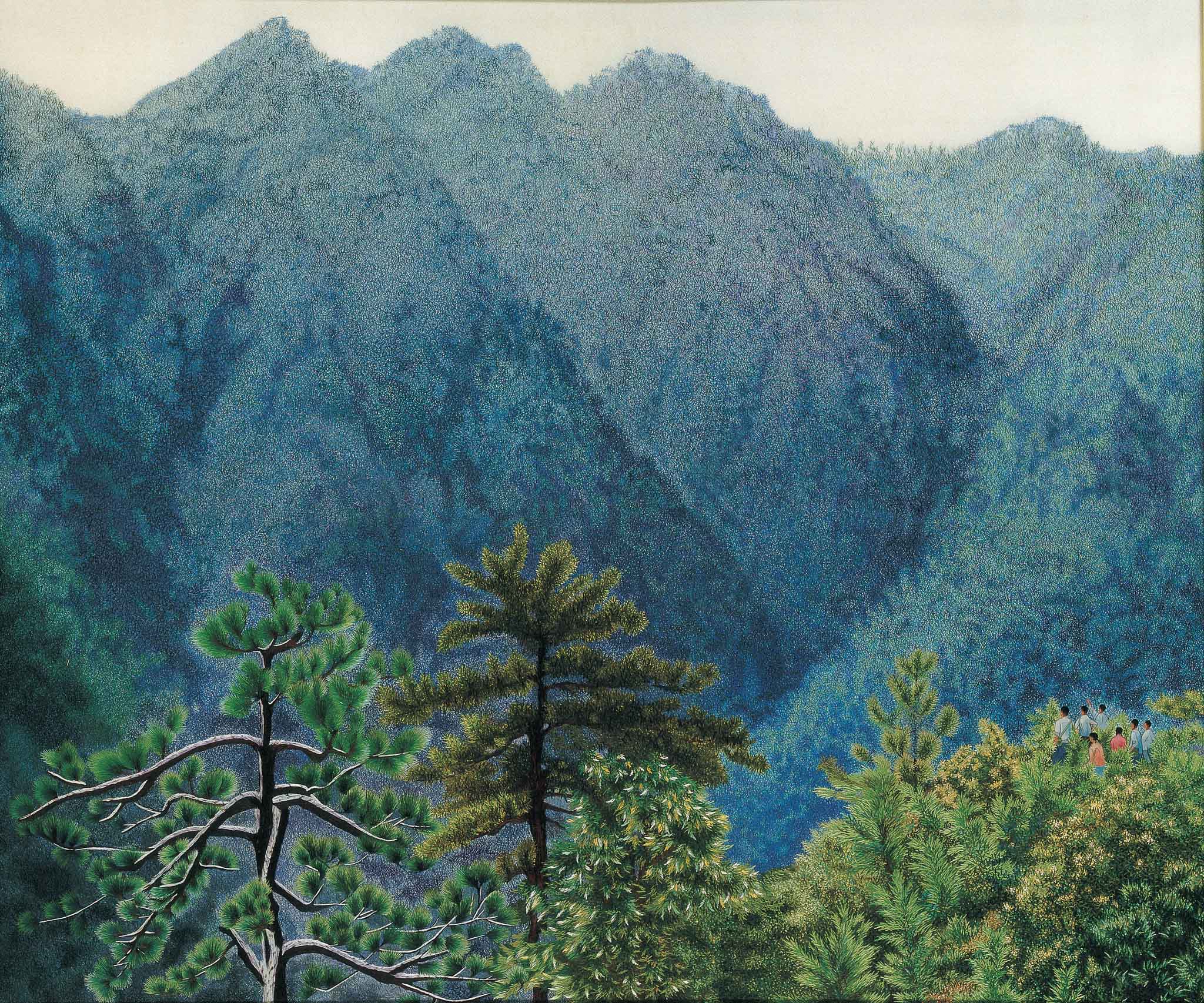
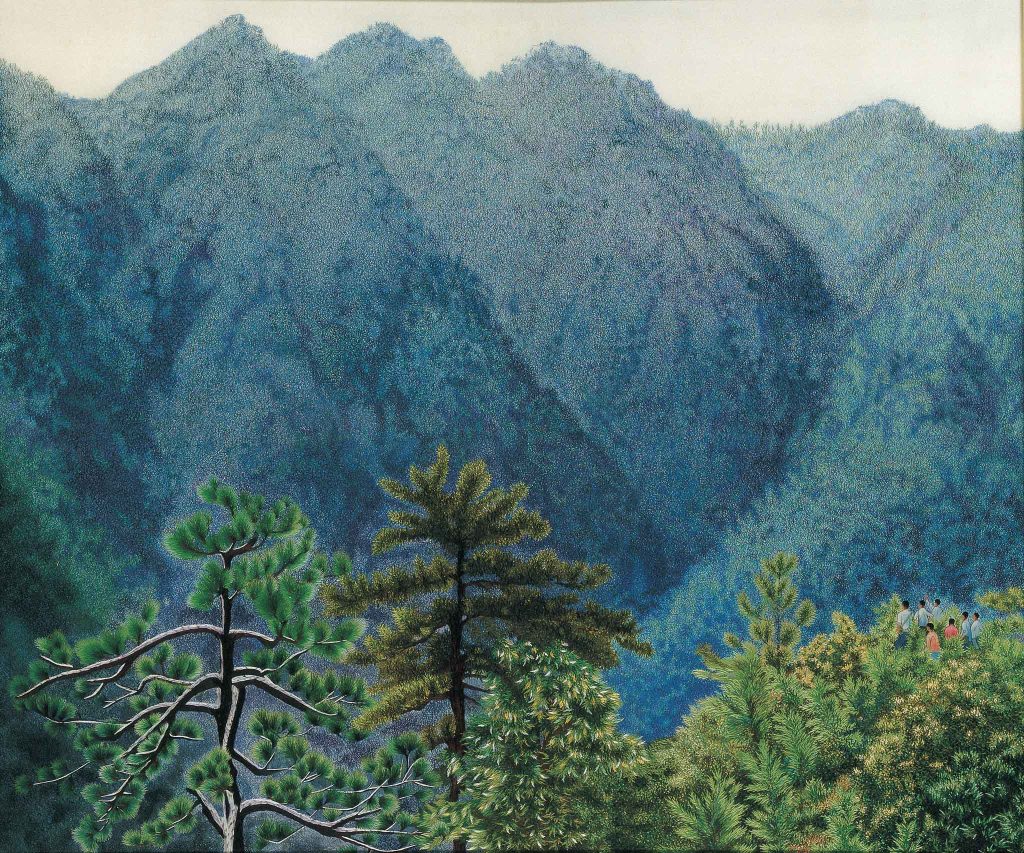
25. The Cradle of Revolution: Jinggang Mountain
Hunan Embroidery. Hunan Embroidery Factory
103.5 × 120 cm, 1968
This embroidery, produced during the Cultural Revolution, depicts the main peak of Jinggang Mountain, an iconic revolutionary site where Mao Ze-Dong and Zhu De founded the first rural revolutionary base in 1927. The site later became a symbol of Communist legacy and was even featured on Chinese currency. The piece primarily uses Free Cross Stitch, Flat Stitch, and Long and Short Stitch to recreate the layered textures of the landscape. Free Cross Stitch was widely employed during the Cultural Revolution for its ability to emulate the effects of oil painting and photography—capturing subtle variations in light, texture, and natural form. This piece is a representative example of Free Cross Stitch in embroidery from the Cultural Revolution period.
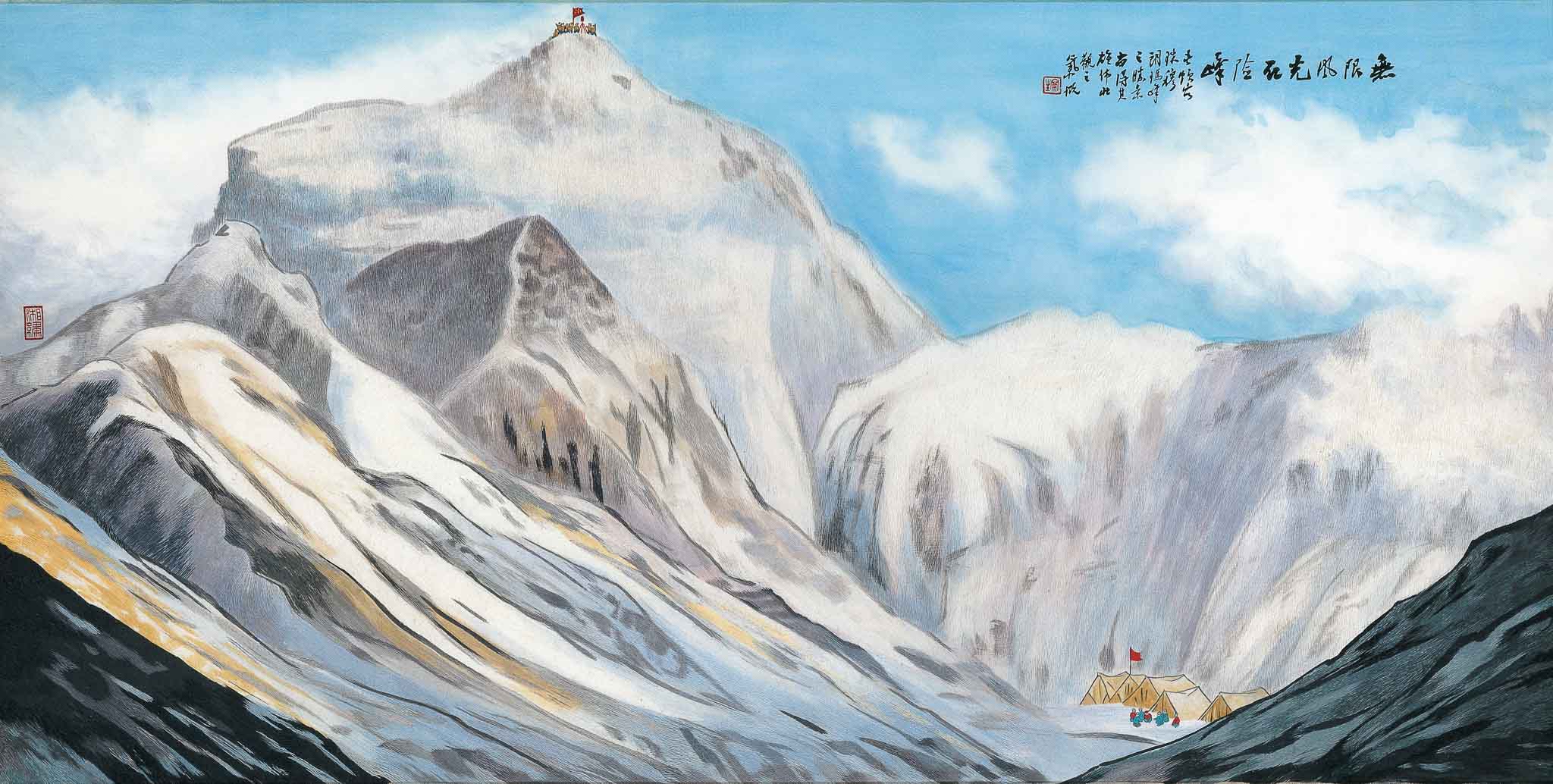
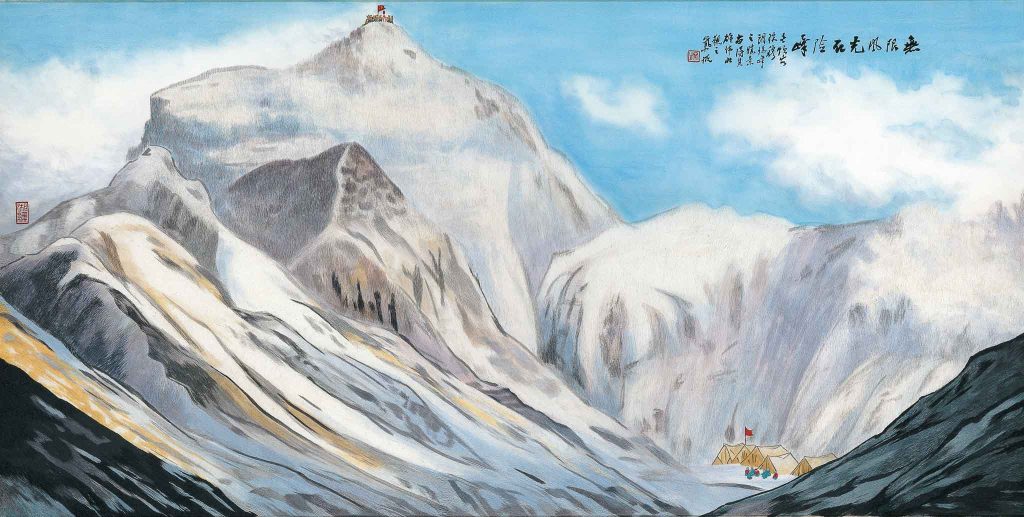
26. Majestic Views from Perilous Peaks
Hunan Embroidery. Hunan Embroidery Factory
77.5 × 140 cm, 1977
In May 1975, the Chinese mountaineering team reached the summit of Mount Everest for a second time. Among them was Pan Duo, the first Chinese woman to accomplish this feat. Created during the Cultural Revolution, this embroidery reflects a period when visual culture was strongly shaped by themes of national achievement, collective heroism, and political ideology. The ascent of the world’s highest peak became a powerful source of inspiration, transformed into a visual image that could be preserved and remembered. In the composition, climbers are shown both pitching tents mid-slope and celebrating with raised flags at the summit. In both scenes, red flags—symbols of communism—stand out vividly against the snow-covered landscape. The piece employs traditional stitches such as Straight Stitch and Long and Short Stitch.
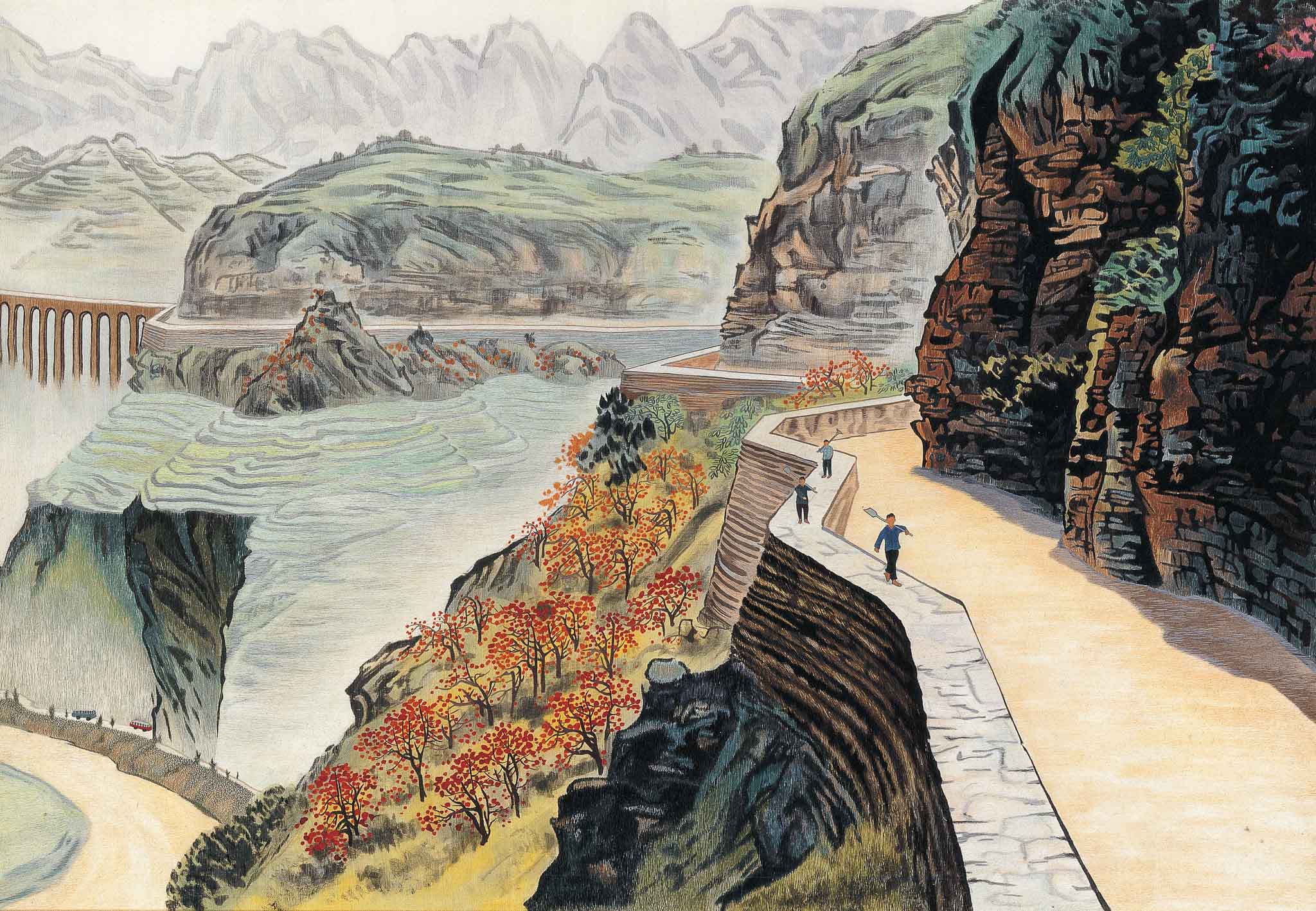
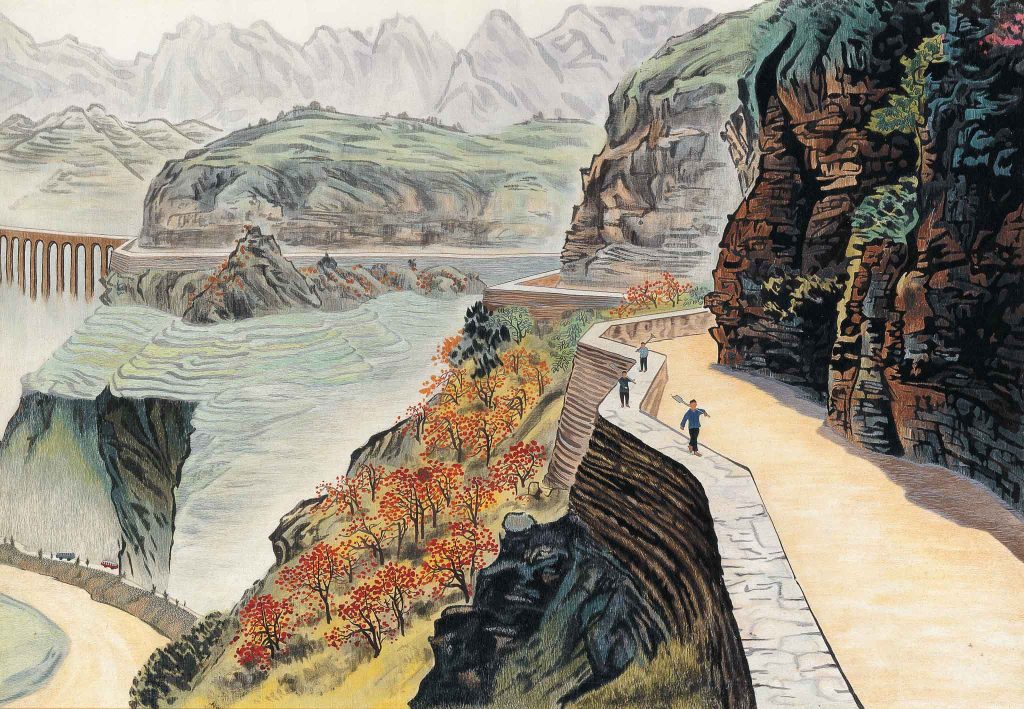
27. Red Flag Canal Encircles the Taihang Mountains
Hunan Embroidery. Hunan Embroidery Factory
86.5 × 118.5 cm, 1972
In the 1960s, to combat chronic drought, residents of Linzhou in Henan Province launched the construction of the Red Flag Canal—a monumental infrastructure project carved by hand into the cliffs of the Taihang Mountains. Artists from the Hunan Embroidery Factory traveled to the site for field sketches, later transforming their observations into embroidery designs. In the foreground, barefoot workers with iron shovels tread the narrow canal path, surrounded by steep precipices. The background unfolds into vast, undulating mountain ranges, evoking both the grandeur of the natural landscape and the determination to reshape it. The work reflects the era’s artistic emphasis on collective labor and political purpose. The piece employs traditional stitches such as Straight Stitch and Long and Short Stitch.
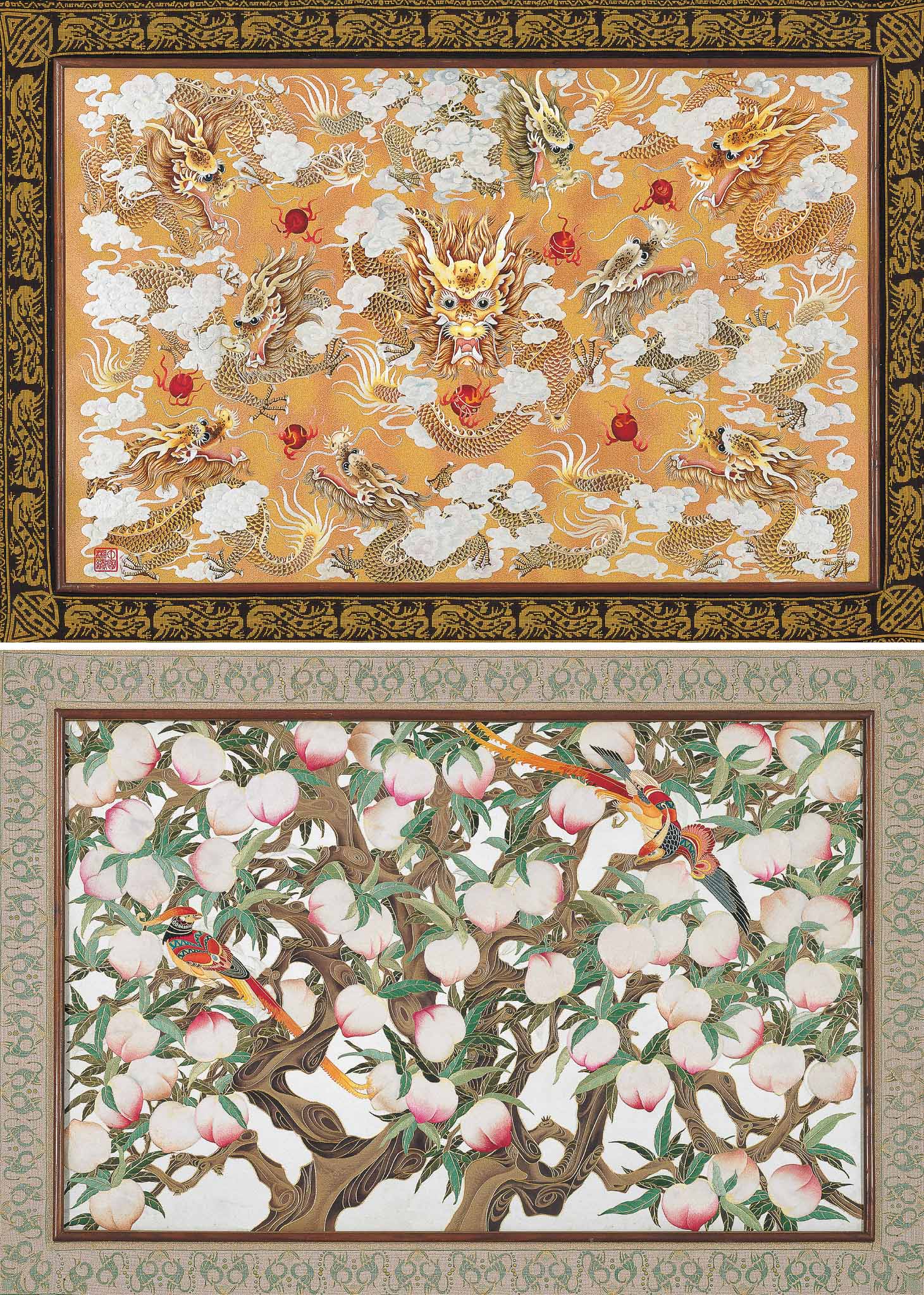
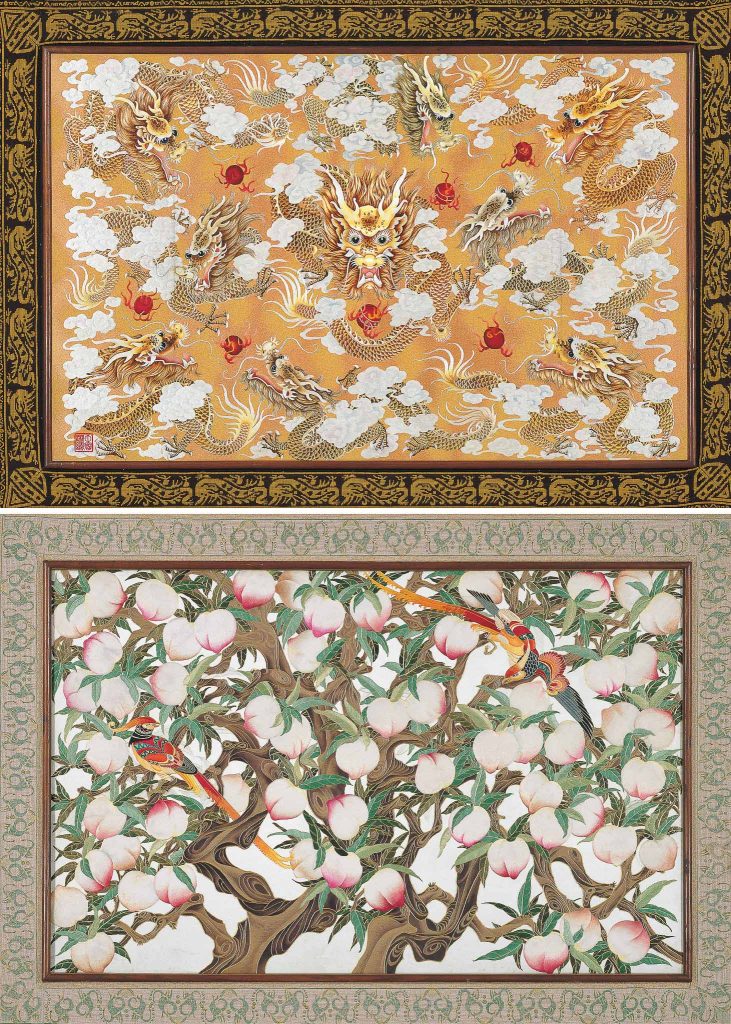
28. Nine Dragons Ascend, Peach and Paradisi
Hunan Embroidery. Hunan Embroidery Institute. Design: Lin Xin-Zhong, Luo Zi-Bin, et al.
180 x 250 x 13 cm, 1986
This work combines traditional techniques with a modern design sensibility. Featuring a double-sided composition, it presents two themes: Nine Dragons Ascending on the front while Peaches and Paradisi on the reverse. The front image is embroidered onto Japanese brocade, whose surface is mottled with metallic sheens of red, yellow, and pink. Using fine-line brushwork as the basis for the composition, the embroiderers employed a range of traditional stitches: Fluffy Stitch, Long and Short Stitch, and Straight Stitch, to create a dynamic scene of nine dragons soaring through swirling clouds. The golden dragons, white clouds, and red orbs blend with the shimmering fabric to evoke a sense of grandeur. The reverse side shifts in tone to reflect folk aesthetics. The peaches and tree trunk were built up with padded and layered elements to create a sculptural effect, enhanced by Couching Stitch that traces the leaves and decorative ribbons. The composition is dense and with a playful and deliberate naivety. The screen is edged with cotton from Tujia ethnic group (ethnic minority in Wuling Mountains in Central China). The work reflects a shift in embroidery from singular craft to integrated design—blending pattern, technique, and material into a unified artistic vision.
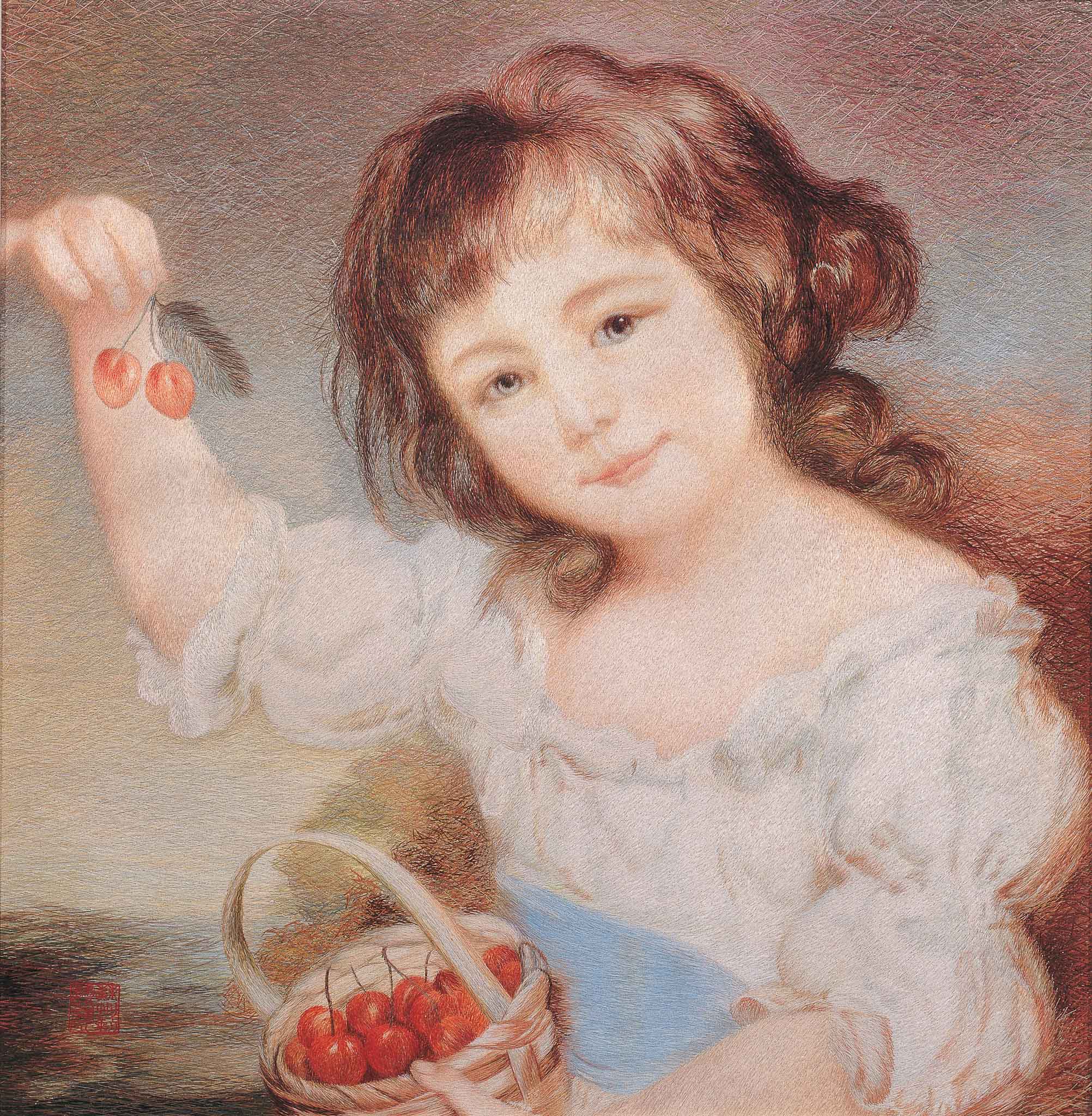
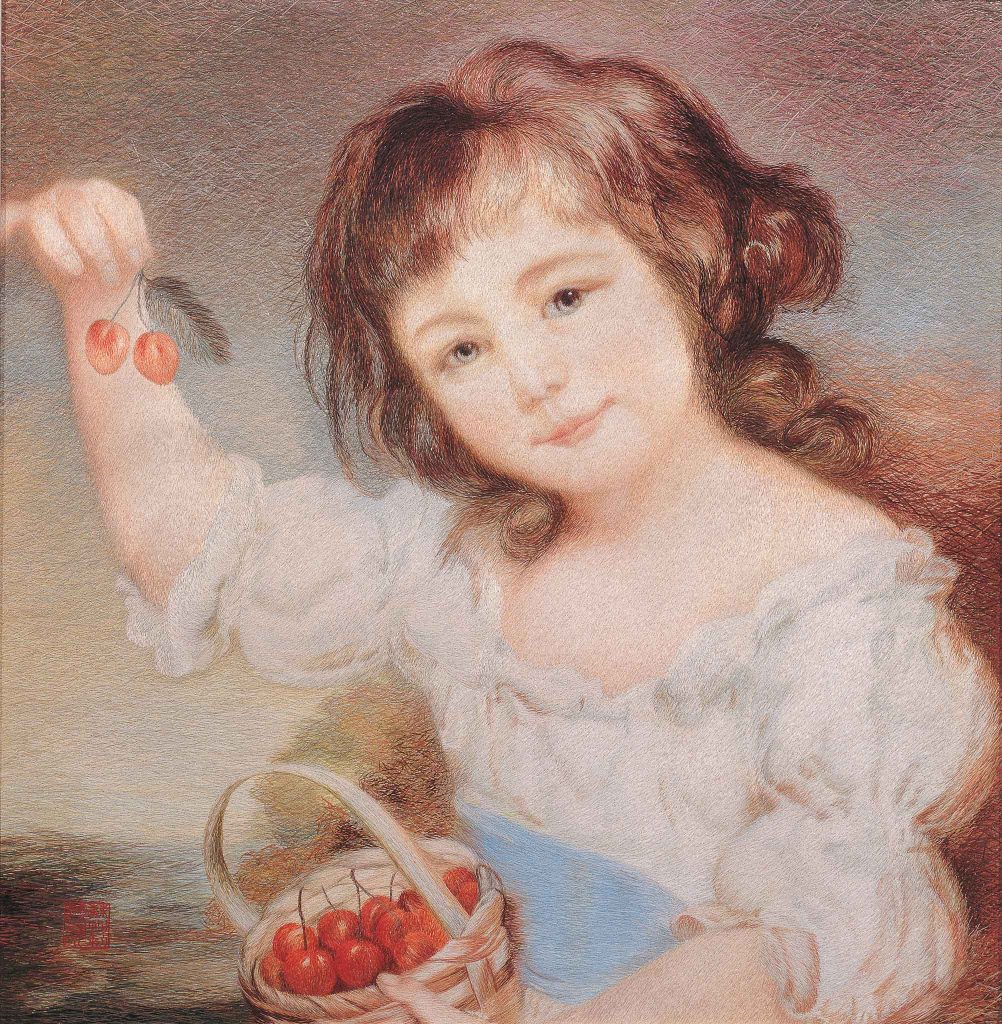
29. Embroidery of John Russell’s Small Girl Presenting Cherries
Suzhou Embroidery. Suzhou Embroidery Research Institute
61 × 61 cm, 1990s
This work is based on a pastel portrait by British artist John Russell (1745–1806), now held in the Louvre. The embroiderer used a variety of techniques to interpret the subtle shifts in color and texture found in the original. The girl’s skin and clothing are rendered with Straight Stitch for smoothness, while her hair is brought to life through a combination of long and short stitches that suggest softness and movement. The background features layered cross-stitching to convey light and depth. This kind of embroidery, which integrates Western techniques of perspective and chiaroscuro, reflects the influence of modern Chinese embroidery reformers such as Shen Shou and Yang Shou-Yu. Drawing from cross-cultural exchanges and studies abroad in the early 20th century, they introduced painterly effects into embroidery, pioneering innovations like Realistic and Free Cross Stitch to simulate the texture and luminosity of Western painting.
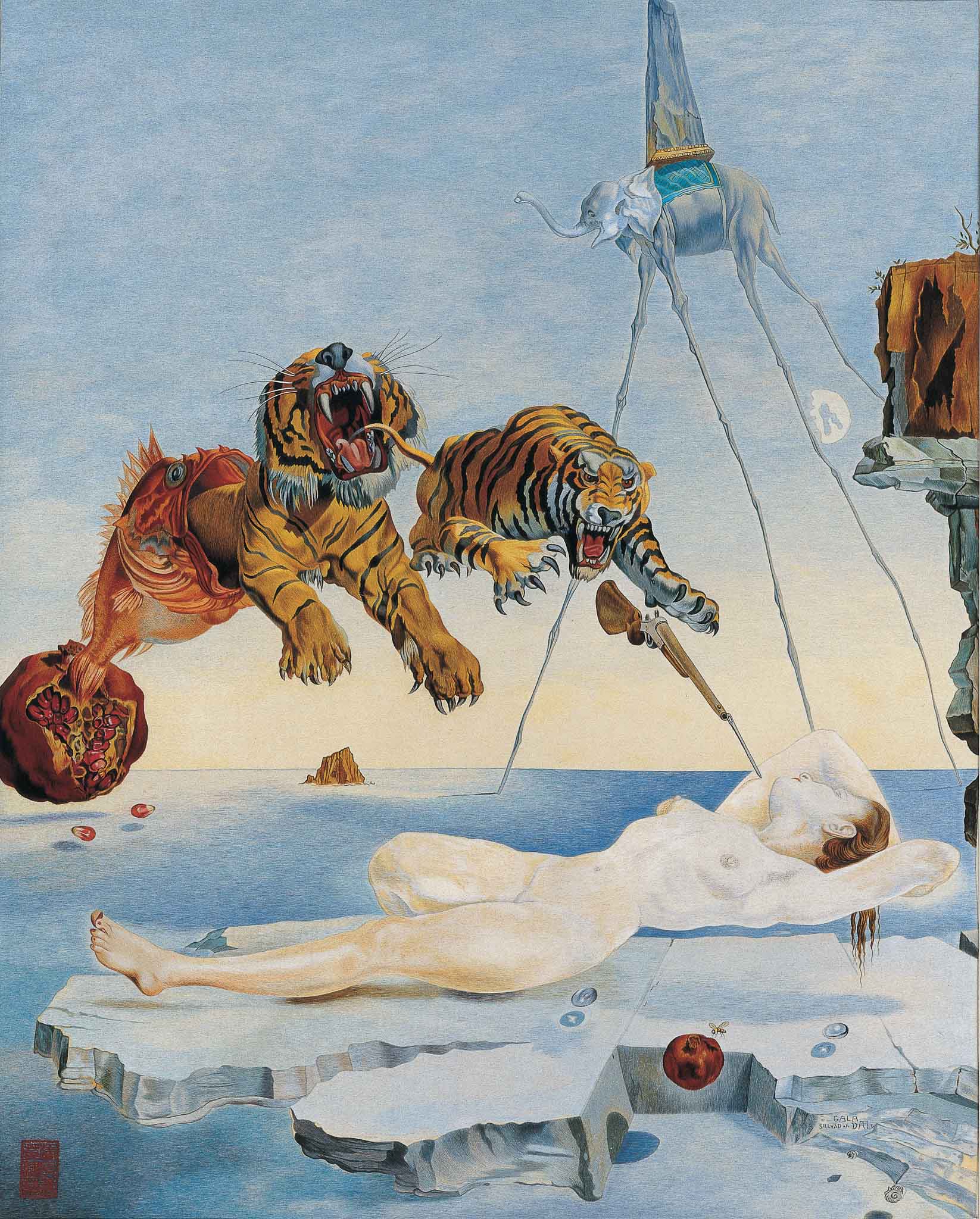
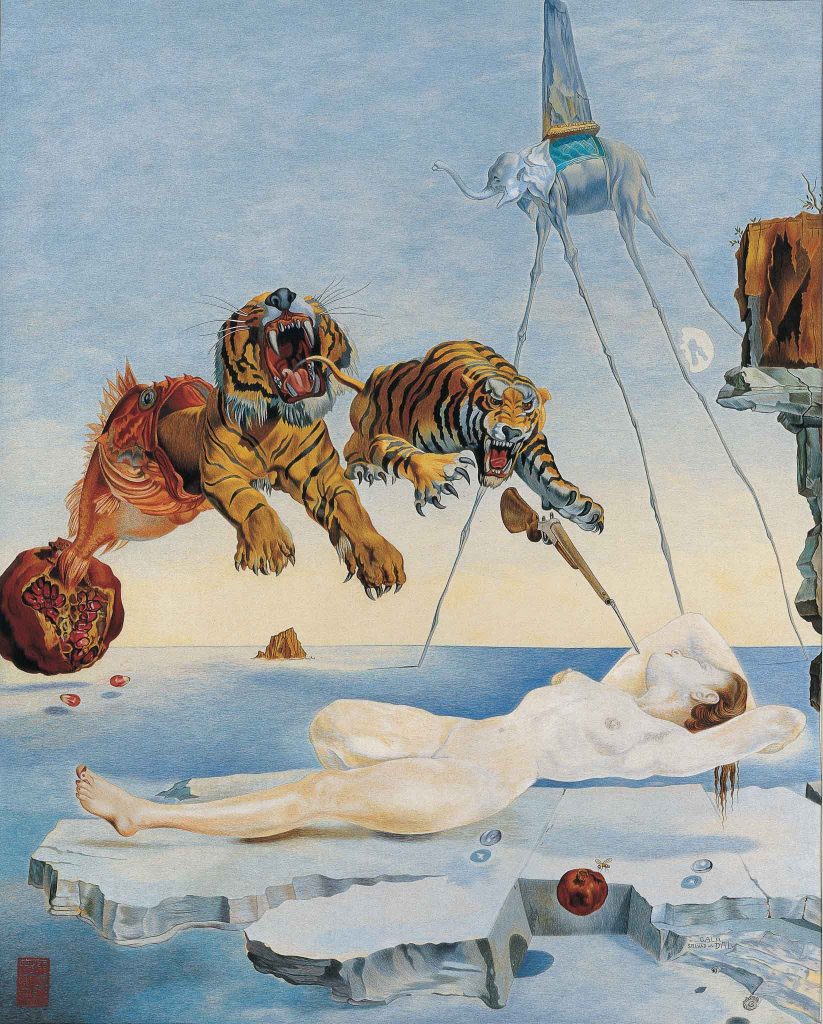
30. Embroidery of Salvador Dalí’s Dream Caused by the Flight of a Bee Around a Pomegranate a Second Before Awakening
Suzhou Embroidery. Lu Jian-Ying Embroidery Studio
101.5 × 86 cm, 1990s
This piece is based on a famous painting by Spanish Surrealist Salvador Dalí. The scene features Dalí’s wife, Gala, her nude body floating weightlessly above a rocky ledge as she drifts into a deep, unguarded dream. Suspended beside her are two drops of water and a pomegranate—an object often associated with fertility and rebirth in Christian symbolism. From the left, a fish bursts from a second oversized pomegranate, its mouth releasing two snarling tigers and a bayonet, all seemingly poised to strike the sleeping figure in the next instant. The silk threads are layered to create smooth tonal shifts and painterly gradients, giving the surface a soft, almost oil-like texture.
